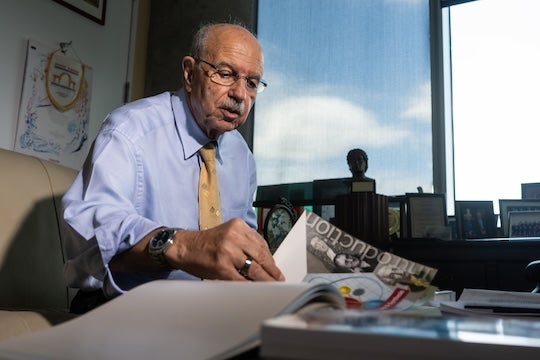
World-renowned organic chemist Kyriacos Costa “K.C.” Nicolaou, a pioneer of total synthesis, fell in love with chemistry as a 16-year-old high school student in the Mediterranean nation of Cyprus, solving complex problems on the classroom chalkboard.
“My chemistry teacher would call on me, ‘Seat No. 21.’ I thought he was being tough. But he was helping me by inspiring me and making me believe I was good in chemistry,” Nicolaou said. “Twenty-one is now my favorite number.”

Nicolaou, the Harry C. and Olga K. Wiess Professor of Chemistry at Rice University, has earned global recognition for his distinguished work in chemical synthesis, vital for advancements in medicine, materials science and chemical biology. Among his many accomplishments, he has synthesized nearly 200 naturally occurring molecules and contributed to advancements in cancer treatments and other areas of medicine.
“This research is challenging but satisfying,” Nicolaou said. “It’s about doing a good service to help society.”
Nicolaou will present his research at the Art and Science of Total Synthesis of Natural and Designed Molecules for Biology and Medicine (ASTS-NDM 2024) symposium Oct. 2-4 in Paris. Held at the historic Club de la Chasse et de la Nature and hosted by Rice Global Paris Center, the event will bring together top minds in the field, including Nobel laureates Barry Sharpless, Ben Feringa and Morten Meldal.
From Cyprus to chemistry
With an early love for science, Nicolaou, now 78, worked through school and earned an undergraduate degree in chemistry in 1969 and a Ph.D. in chemistry in 1972, both from the University of London.
Nicolaou moved to the United States in 1972 then spent a year at Columbia University as a postdoctoral fellow under the supervision of Thomas Katz and three years at Harvard University under the supervision of Nobel Prize winner E.J. Corey, learning about total synthesis. Nicolaou ultimately dedicated nearly five decades to a lifelong chemistry career focusing on that same subject.
Total synthesis enables the creation of complex molecules from simple chemical building blocks. Nicolaou’s work has led to innovative synthetic strategies and methods for creating lifesaving compounds in the lab rather than relying on harvesting natural resources.
“We look for molecules with important biological properties that come from nature,” Nicolaou explained. “We synthesize them and their analogue variations in the laboratory, setting the foundation of drug discovery and development by pharmaceutical companies.”
Pioneering cancer research
That includes cancer treatments on which Nicolaou’s research has made a significant impact. His work includes the synthesis of natural anticancer agents such as Taxol and calicheamicin.
Taxol, also known as paclitaxel, is used in chemotherapy to treat several types of cancer, including ovarian and breast cancers, while calicheamicin plays a critical role in antibody-drug conjugates (ADC), a class of cancer-fighting drugs.

Nicolaou synthesized the first example of an ADC in 1998 using a calicheamicin analog as a payload that showed unique anticancer properties in mice. This development was followed by the first clinical ADC (Mylotarg) produced by a company (Lederly, now Pfizer) in 2000 and used to treat acute lymphocytic leukemia. Today, numerous ADCs treat various types of cancer.
Nicolaou also was the first to synthesize rapamycin, a drug that suppresses the immune system and reduces cancer cell growth.
“The pharmaceutical companies get help from academic scientists like me, who do the fundamental science and train the students in the synthesis of molecules,” Nicolaou said.
Educating and training students in total synthesis and methodology to provide experts for pharmaceutical companies to hire as their medicinal and process chemists serves as the basis of the industry, Nicolaou said.
“In terms of contributions to society and the young generation, the field of synthetic organic chemistry is uniquely essential and continues to advance,” Nicolaou said.
A lasting legacy at Rice
Teaching the next generation of scientists who will continue to create vital compounds to help humanity is as important as the research, Nicolaou said. He has been doing just that at Rice since 2013 when he joined the university’s faculty from the Scripps Research Institute supported by a $6 million research grant from the Cancer Prevention and Research Institute of Texas.
The university’s proximity to the Texas Medical Center has been essential to his research, fostering collaboration between academic and medical professionals and advancing his research even further.
“Collaboration is very fruitful in science. If you don’t collaborate, your work can’t be put into action,” Nicolaou said. “It’s important to have this, and at Rice University, we are perfectly positioned for it.”
Nicolaou was hailed as “the world leader of the present generation in the field of total synthesis” by the Wolf Prize in 2016 and “a modern alchemist” by the Benjamin Franklin Medal in 2011. In 2021, he won the Robert Koch Gold Medal and was named a Greek Pioneer in Medicine and Biomedical Sciences by the ARISTEiA Institute.
For more information on ASTS-NDM 2024, please visit the website.
Media are invited to attend the symposium. For credentials, please contact Estelle Dubernard, director of strategic alliances at Rice Global Paris, at ed22@rice.edu.

